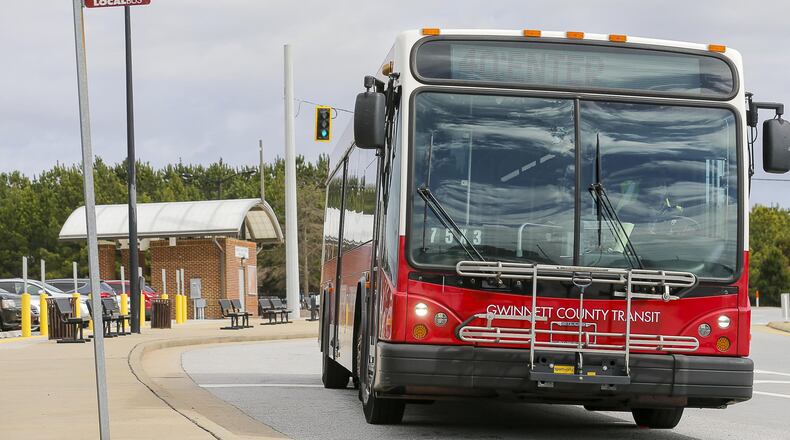Last Saturday morning, a group of Gwinnett County volunteers pored over maps and compared costs, weighing the county’s transit options.
They’ve been at it for months, and are nearly ready to make their suggestions to elected county officials — a task they’re required to do by the end of January.
Then, Gwinnett commissioners will decide whether to put a transit referendum back on the ballot, and when.
But one county commissioner, Ben Ku, is concerned that the transit review committee's proposal won't overcome deficiencies in a transit plan that was shot down by voters last March.
In two presentations earlier this month, to the committee and to the Board of Commissioners, Ku proposed a plan that would do more than existing recommendations — by immediately offering reliable service on fixed routes using existing county buses, and adding more connections on some routes including a possible extension to Athens.
“I know it’s late in the game, but I do have concerns,” Ku told county commissioners in a Jan. 7 briefing.
Ku said much of his plan mirrors Connect Gwinnett, the original proposal, and the committee has incorporated some of his ideas to create more connections along routes. But his full proposal also includes trail and microtransit connections.
“It never hurts to have too many good ideas,” Ku said Friday.
But Laurie McClain, the chair of the transit review committee, said she didn’t think it was fair to consider Ku’s proposal because it had not been fully vetted. The existing options have been in the works for years, and the committee has been refining them since October, McClain said.
She asked Ku not to present to her group, but he chose to anyway. McClain said she’s concerned other people with ideas about the best way to get transit expansion will also seek to have their proposals heard, at a point when the group is finalizing its draft considerations for approval.
“There’s really no opportunity for us to take anything he had to offer and do anything with it,” McClain said. “I do think there will be opportunities down the road to look at them, vet them, see if they can be incorporated.”
Others expressed different concerns about Ku’s proposal.
Charlotte Nash, chairman of the Gwinnett County commission, pushed back against Ku’s assertion that his plan would reduce congestion. She also questioned how moving existing bus routes would affect the county’s paratransit services and wondered if there was a restriction on using county sales tax money to build transit infrastructure outside Gwinnett, to connect to the existing system.
“It’s just a very complicated mix of legal stuff to deal with,” she said.
Linnea Miller, a Suwanee city council member and committee member, said she had “high-level concerns” about Ku’s suggestions, including his assumption that it was the original plan itself that was a problem and not the timing of the referendum.
Miller also said she wanted to ensure that public process was honored, and that Ku’s plan — which has never been presented for public comment — doesn’t usurp a lengthy, considered process. She didn’t know how much it would cost to vet the commissioner’s plan, she said, or if it was feasible.
Ku acknowledged that there were still numbers to run in his proposal — what ridership estimates might be, for example — but said he thought questions about its efficacy could be answered. If it takes more time to ensure voters have a plan they can support, he said, so be it.
“I think it’s better to wait two years than have to wait a decade or more,” Ku said.
Not everyone shared that sentiment.
McClain, the head of the review committee, said she thought the decision to make the vote during a low-turnout March election handicapped its success tremendously. She went so far as to say an identical plan on the November presidential ballot might succeed.
“It’s an exercise to know if it’s a referendum or a plan problem,” she said. “If it gets shot down in November, then I think maybe we start from scratch. We may have to.”
The expected proposal from the committee has changes from the original March measure, but it does use that plan as a base. McClain said the improvements include more transit access in the south part of the county, where options were limited. The group has two more meetings before the end of the month where it will finalize the recommendations it is sending to commissioners.
Right now, the proposal under consideration is a $6.7 billion plan that in its first five years would expand local bus service, upgrade and add park-and-ride lots, create new flex services and expand express bus service. At the end of 30 years, it would extend rail to Jimmy Carter Boulevard, build four bus rapid transit lines, add more local bus routes with Sunday service and add eight new park-and-ride lots, among other improvements.
More than half the county’s population would be served by transit, as compared to 11% now.
“Every person in that room feels good about where we are,” McClain said. “It’s a good plan. We’re proud of what we’ve done.”
About the Author
Keep Reading
The Latest
Featured



